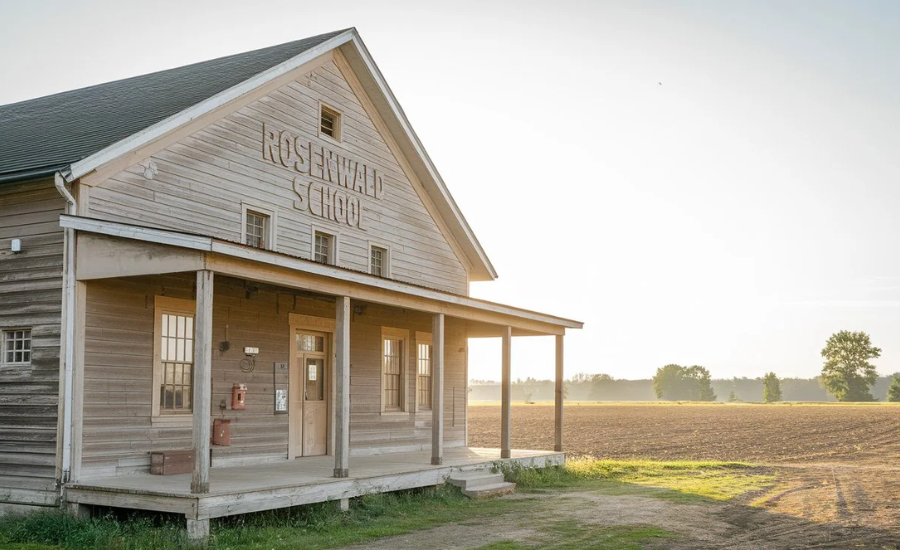The Rosenwald Schools hold a foundational place in the history of American education, particularly in the advancement of educational access for African American children in the early 20th century. Spearheaded by Julius Rosenwald, a philanthropist and part-owner of Sears, Roebuck, and Company, the Rosenwald Schools were pivotal in providing quality education to African American students in the segregated South. Among the many educators dedicated to this mission was Mrs. Geeder Rosenwald School, a passionate and trailblazing teacher who profoundly impacted the lives of her students at her Rosenwald School. This article explores Mrs. Geeder’s legacy, her unwavering commitment to education, and the enduring influence of the Rosenwald Schools.
Who Was Mrs. Geeder? A Beacon Of Hope In The Rosenwald School System
Mrs. Geeder Rosenwald School was more than a teacher; she was a guiding light for African American students during an era of deep racial inequality and limited educational resources. Raised in a time when African American communities faced significant barriers to education, Mrs. Geeder’s path to becoming an educator in a Rosenwald School was both a personal mission and a commitment to social change. She held a firm belief that education could break cycles of poverty and empower African American children to create a better future.
For Mrs. Geeder, teaching was not merely about following a curriculum; it was about instilling a love for learning and a belief in one’s potential. In her Rosenwald School classroom, she emphasized the importance of knowledge and encouraged her students to dream big in a society that often discouraged them from doing so. Her role as an educator was central to her students’ lives, symbolizing a beacon of hope and opportunity in a world that frequently marginalized their aspirations.
The Vision Behind Rosenwald Schools And Julius Rosenwald’s Mission For Equality

The Rosenwald Schools were the brainchild of Julius Rosenwald, a visionary businessman with a profound commitment to social justice. Partnering with Booker T. Washington, a prominent African American leader and founder of the Tuskegee Institute, Rosenwald was determined to enhance educational access for African American students in the segregated South.
In 1917, he established the Rosenwald Fund, a philanthropic initiative aimed at building schools for African American children. Unlike many charity programs of the time, the Rosenwald School project was unique in that it required active participation from local communities, who contributed funds, materials, and labor to the school’s construction. This collaborative effort fostered a sense of ownership and investment among the African American communities, who saw the Rosenwald Schools as a rare opportunity to create better futures for their children.
The Reach Of Rosenwald Schools: An Educational Lifeline Across The South
From 1917 to 1932, more than 5,000 Rosenwald Schools were established in 15 Southern states, providing African American children access to education in regions that had been historically underserved. These schools became the center of community life, offering not only education but also a sense of pride and unity within neighborhoods that faced discrimination and poverty.
Though Rosenwald Schools helped bridge some of the educational disparities caused by segregation, students and teachers faced numerous challenges. The schools were often overcrowded and under-resourced, with limited access to textbooks and supplies. However, educators like Mrs. Geeder maximized the tools they had, turning adversity into an opportunity to innovate and inspire. The Rosenwald School network, symbolized by Mrs. Geeder Rosenwald School dedication, became a cornerstone of African American educational history and a foundation for the Civil Rights Movement decades later.
Mrs. Geeder’s Legacy At Her Rosenwald School: A Champion For Education

Mrs. Geeder’s contributions as a Rosenwald School teacher went beyond the standard expectations. In her classroom, she created an environment where curiosity thrived, nurturing her students’ critical thinking and encouraging them to explore subjects such as history, literature, and social justice. Through limited resources, Mrs. Geeder used creative methods to engage her students, instilling in them the confidence to question, learn, and grow.
Mrs. Geeder Rosenwald School’s involvement in her students’ lives extended outside the classroom as well. She regularly met with parents, encouraging them to prioritize their children’s education despite economic pressures that often forced young students to work. She was an advocate not only for her students but for education as a pathway to a brighter future for the entire community. Her relentless dedication to ensuring her students received an education helped countless children stay in school and recognize their potential.
Overcoming Adversity: Mrs. Geeder’s Impact On Her Rosenwald School Community
Teaching in a Rosenwald School during the oppressive Jim Crow era posed immense challenges. Mrs. Geeder Rosenwald School faced systemic racism, inadequate funding, and societal indifference toward African American education. Yet, she approached each obstacle as a chance to make a more meaningful impact. Her resilience inspired her students and served as a testament to the strength and determination within her community.
A defining aspect of Mrs. Geeder Rosenwald School work was her ability to foster a strong sense of community and mutual support among her students. She emphasized that education was not only a personal journey but a shared one, empowering her students to support each other and work toward collective advancement. Many of Mrs. Geeder’s former students would later become leaders and advocates, drawing from the values and inspiration she instilled in them.
The Broader Impact Of Rosenwald Schools On The Civil Rights Movement

The Rosenwald Schools laid the educational foundation for what would eventually become the Civil Rights Movement. Many movement leaders, including figures like Dr. Martin Luther King Jr., either attended Rosenwald Schools or were influenced by the educators who came from this system. The knowledge and self-confidence that Rosenwald Schools imparted helped to inspire a generation that would demand equality and justice.
Mrs. Geeder Rosenwald School’s contributions to her Rosenwald School, along with the efforts of many other dedicated educators, were instrumental in shaping the minds and values of future civil rights activists. By providing students with an education that encouraged critical thinking and self-worth, these schools—and Mrs. Geeder’s commitment to them—became catalysts for change.
Preserving The Legacy Of Rosenwald Schools And Mrs. Geeder’s Enduring Influence
While many Rosenwald Schools have since closed, their legacy endures. Efforts are ongoing to preserve the remaining Rosenwald School buildings as historical landmarks, honoring the resilience and determination of the communities that built them. These buildings stand as reminders of a time when African American communities united to create opportunities for their children, despite overwhelming adversity.
Mrs. Geede Rosenwald School’s story is an indelible part of this legacy. Her dedication to her students, her passion for education, and her belief in the potential of every child continue to inspire educators today. Though the Rosenwald Schools are no longer in operation, the principles they championed—equality, empowerment, and the pursuit of knowledge—remain as relevant as ever. In celebrating Mrs. Geeder’s contributions to her Rosenwald School, we remember the vital role that education plays in achieving a more equitable society.
FAQs About Mrs. Geeder Rosenwald School
- Who was Mrs. Geeder, and why was she important to the Rosenwald Schools?
Mrs. Geeder was a dedicated teacher at Rosenwald School, inspiring many students to pursue education and brighter futures despite limited resources and racial segregation.
- What were the Rosenwald Schools?
Funded by philanthropist Julius Rosenwald and partnered with Booker T. Washington, the Rosenwald Schools aimed to improve education for African American children in the segregated South.
- How did Julius Rosenwald support education for African American students?
Rosenwald created the Rosenwald Fund to build schools for African American communities, encouraging local involvement and community pride.
- What role did Rosenwald Schools play in the Civil Rights Movement?
Rosenwald Schools educated future Civil Rights leaders, fostering empowerment and social awareness among African American students.
- What obstacles did Rosenwald School teachers face?
Teachers like Mrs. Geeder contended with racism, underfunding, and scarce resources but creatively inspired and supported their students.
- Why are Rosenwald Schools remembered today?
The schools’ legacy continues as symbols of resilience and educational opportunity, with efforts to preserve their historic impact on African American communities.
Conclusion
The legacy of Mrs. Geeder and the Rosenwald Schools stands as a testament to resilience, courage, and the transformative power of education amid hardship. Teachers like Mrs. Geeder turned their classrooms into havens of learning, inspiration, and opportunity. Their dedication laid the groundwork for brighter futures and instilled values of community, strength, and the potential of education to drive change. Though the Rosenwald Schools are no longer active, their spirit endures, reminding us of the vital role education plays in fostering a fair and just society. Honoring these schools and their remarkable educators underscores the importance of education in creating a more equitable world.
Subscribe for the latest news and alerts: Pudelek!
